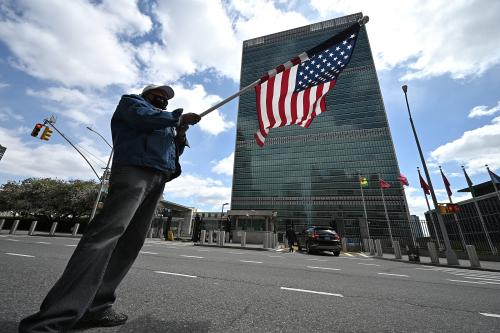The shocking images of innocent civilians streaming out of Ukraine are a vivid reminder of war’s brutality, but also the need for preparation in a world where events can change quickly. Several years ago, I wrote a Brookings Press book entitled Megachange: Economic Disruption, Political Upheaval, and Social Strife in the 21st Century. It argued we live in an era of large-scale transformation and that we should expect surprising developments in the 21st century. At the time, I did not imagine a Russian invasion of Ukraine nor millions of refugees being forced by violence to move into Poland, Hungary, or Romania.
Yet recent events provide a wake-up call about the need during the contemporary period to prepare for the unexpected and to think about survival strategies. War can be a gigantic disruptor, especially when powerful nations are involved, and people should anticipate ramifications for money, food, medicine, and the information ecosystem.
This is especially the case in the digital era because we all have grown used to ready access to information, ubiquitous digital devices, and the ability to purchase online goods and services whenever we want and have them delivered to our homes within hours. But the onset of war in Ukraine and the dramatic disruption of civilian life reminds us to prepare for scenarios where current digital conveniences may be unavailable.
In this post, I present a brief guide to surviving digital war. Even in lands far distant from Ukraine, I argue we need to think about cyber-risks, threats to critical infrastructure and our digital economy, and steps people should consider in case hostilities spread beyond Ukraine.
Cash is king
Key hallmarks of our contemporary system are the ubiquity of mobile devices, easy access to electronic payments, and ready availability of credit cards and digital payment systems. For years, we have proclaimed the convenience of digital services and how they empower people and let individuals control their own destinies.
Yet people should realize that a large component of war in the 21st century is digital in nature. Although much of the media coverage focuses on tanks, troops, and missiles, contemporary warfare is likely to have a digital component that disrupts ATMs, email communications, power grids, and digital transactions.
In this situation, it is important to keep a ready supply of cash in case the banking system or e-commerce is disrupted. A few years ago, there was a power outage in Washington, DC and my local retail outlet could not accept credit cards or digital payments because its computers were down. That day, I happened to have enough cash to pay for my purchases, so it is good to have sufficient cash to deal with short-term emergencies.
Think about alternative power supplies
In a digital era, we sometimes forget how much of our existence depends on critical infrastructure powered by digital components. Over the last year, we have seen our automobile sector hobbled by a chip shortage, our dependence on global supply chains, attacks on critical infrastructure, and how so many aspects of healthcare, education, and transportation depend on electronics.
We take our electric grid for granted as we use it to watch the news, recharge our phones, and power our laptop computers. But for years, there have been allegations that Russia has planted malware in our electric grid, and in the case of armed hostilities could disrupt electricity networks without sending a single troop to the United States.
Now that Russia has invaded Ukraine and threatened the U.S. and NATO, we should understand that cyberwar can pose far-reaching risks. There likely would not be a single Russian soldier on U.S. territory, but that does not mean that our electric grid and critical infrastructure are secure. Just as a Russia-based crime group is thought to have disrupted the nation’s gas supply during its 2021 hack of Colonial Pipeline, that nation or individuals within its territory could do so on a larger scale with the electric grid, gas supplies, or other essential materials.
Faculty at some German universities have complained on social media sites about their email going down for several hours. While the origins of these problems are unclear, the issue highlights the vulnerabilities of basic communications and the need for personal vigilance against malware, phishing attacks, and ransomware takedowns.
Having solar panels for cellphone recharging and mobile generators to power a refrigerator or microwave should be basic planning in cases where cyber-attacks are real and just as threatening as a highway filled with tanks. These items are readily available online and provide useful power backups in case of cyber-attacks.
Secure your valuable papers through a digital backpack
The Ukraine refugee crisis highlights the need for short-term survival items and essential papers such as passports, birth certificates, wedding certificates, financial documents, medical records, and identification cards. Experts suggest preparing a go pack or a digital backpack that has survival tools and records of valuable papers, documents, certificates, and photos. This is especially the case with hard-to-replace financial and medical information, but also any materials that you might need if you needed to relocate quickly.
Stockpile food, medicine, and basic necessities
In Washington, DC, I live within walking distance of about half a dozen groceries. I shop every few days and follow a “just-in-time” model of food supplies. When I need something for dinner, I go shopping a few hours before mealtime. I rarely am disappointed because my local stores almost always are fully stocked with the items I wish to purchase.
During wartime or armed hostilities, however, people should not assume a ready and undisrupted supply of food and medicine. As America discovered in the early days of COVID, many of our medicine and supplies are made in China, and if the Ukraine conflict spreads beyond that country, Americans should not assume normal production schedules and supply chains. Instead, there will be bottlenecks, shortages, and price-gouging that will complicate all of our lives.
My grandfather during the Great Depression kept the family farm alive by selling meat, eggs, fruits, and vegetables in nearby towns. He was not familiar with what we today call the “slow food” movement and reliance on local distributors. But he personified locally grown food and helped city folks survive the food shortages of that era. There is a clear lesson today for city-dwellers, which is to make friends with the local producers who populate your city’s farmers markets.
Prepare for political upheaval
A final point to consider is how war can have surprising domestic political consequences. While Franklin Roosevelt served four terms in the 1930s and 1940s, we should remember the case of Lyndon Johnson, whose presidency was cut short by setbacks in Vietnam, and how war imperiled the second term of George W. Bush.
War can redefine the national agenda, generate shifts in political coalitions, and lead people who previously were antagonistic to come together in a common cause. As evidenced by the cases of WWII, Vietnam, and Iraq, war can lead either to unity or divisiveness. With our current high levels of political polarization, we should not expect our domestic politics to be tranquil when there is armed aggression and complex geopolitics. During times like those, people should expect the unexpected and not be surprised by large-scale political developments.
The Brookings Institution is committed to quality, independence, and impact.
We are supported by a diverse array of funders. In line with our values and policies, each Brookings publication represents the sole views of its author(s).








Commentary
Surviving digital war
March 16, 2022